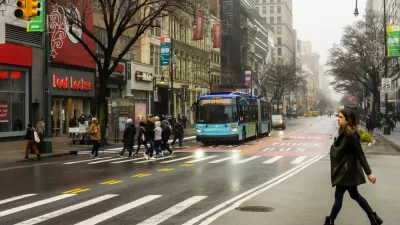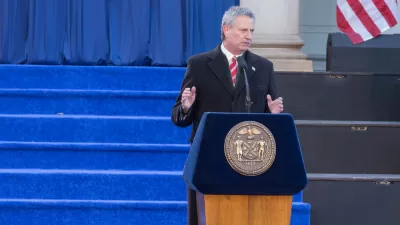The U.S. Conference of Mayors recently released the results of the 2015 Menino Survey of Mayors, which finds political support for bike lanes has reached the highest ranks of local government.
Michael Andersen reports some of the results of the 2015 Menino Survey of Mayors [pdf], released last week by the U.S. Conference of Mayors. Andersen's interest is in the opinions of the 89 mayors surveyed on the subject of bike infrastructure—and he finds surprising results.
According to Andersen, a large and bipartisan majority of U.S. mayors want to make transportation infrastructure "more space-efficient, cost-effective, and economically productive by adding bike facilities in place of extra passing lanes or on-street parking spaces."
Despite the support for bike infrastructure on either side of the political spectrum, the survey revealed a gap in preferences between the two parties. "There was a clear divide between Democratic and Republican mayors. About 80 percent of Democratic mayors agreed with the statement about prioritizing biking improvements over the status quo. GOP mayors split on the question 43 percent to 43 percent, with the remaining 14 percent undecided," reports Andersen.
The article includes additional insight into the political support for bike infrastructure among the nation's mayors, which the survey approached with several different lines of questioning.
FULL STORY: 70 PERCENT OF U.S. MAYORS WOULD BACK BIKE LANES OVER PARKING OR PASSING LANES

Alabama: Trump Terminates Settlements for Black Communities Harmed By Raw Sewage
Trump deemed the landmark civil rights agreement “illegal DEI and environmental justice policy.”

Planetizen Federal Action Tracker
A weekly monitor of how Trump’s orders and actions are impacting planners and planning in America.

The 120 Year Old Tiny Home Villages That Sheltered San Francisco’s Earthquake Refugees
More than a century ago, San Francisco mobilized to house thousands of residents displaced by the 1906 earthquake. Could their strategy offer a model for the present?

In Both Crashes and Crime, Public Transportation is Far Safer than Driving
Contrary to popular assumptions, public transportation has far lower crash and crime rates than automobile travel. For safer communities, improve and encourage transit travel.

Report: Zoning Reforms Should Complement Nashville’s Ambitious Transit Plan
Without reform, restrictive zoning codes will limit the impact of the city’s planned transit expansion and could exclude some of the residents who depend on transit the most.

Judge Orders Release of Frozen IRA, IIJA Funding
The decision is a victory for environmental groups who charged that freezing funds for critical infrastructure and disaster response programs caused “real and irreparable harm” to communities.
Urban Design for Planners 1: Software Tools
This six-course series explores essential urban design concepts using open source software and equips planners with the tools they need to participate fully in the urban design process.
Planning for Universal Design
Learn the tools for implementing Universal Design in planning regulations.
Clanton & Associates, Inc.
Jessamine County Fiscal Court
Institute for Housing and Urban Development Studies (IHS)
City of Grandview
Harvard GSD Executive Education
Toledo-Lucas County Plan Commissions
Salt Lake City
NYU Wagner Graduate School of Public Service





























